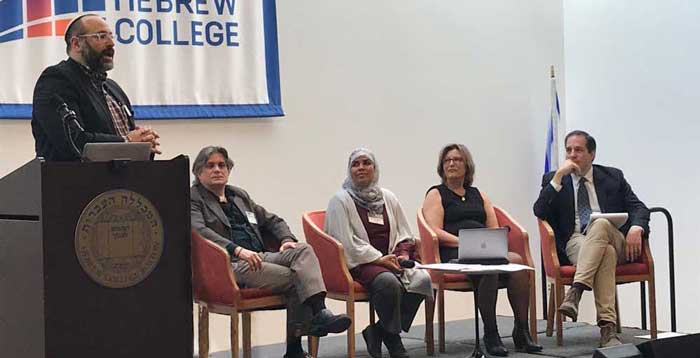Community Blog Learning how to talk about dying

When Philip Mamalakis, assistant professor of Pastoral Care at Hellenic College in Brookline, spoke of the sacred time he spent with his mother during the last weekend of her life at the Dying Well conference last week, I immediately flashed back.
Fourteen years ago, when I spent a weekend with my mother during her final days of life, she asked me to make her a milkshake — something that had been prohibited with her years of diabetes — and then commented on how much her grandchildren would miss her (so true!). I also found myself humming the melodies our family sang to her as she took her last breaths.
I work at Hebrew College, which hosted and helped organize the conference, along with other members of the Boston Theological Interreligious Consortium. But I also attended the conference for myself. And for me, as well the other 149 participants — who represented a plethora of faiths and professions — it was a deeply moving experience.
Beginning with a panel discussion facilitated by Rabbi Or Rose of Hebrew College’s Miller Center, five remarkable end-of-life professionals from diverse faith traditions — Jewish, Buddhist Muslim, and eastern Orthodox — all expressed one thing in common: their commitment to their work is deeply rooted in their personal experiences with death and dying.
This was not a conference designed to teach about “end-of-life” conversations but rather to engage participants in these conversations. Through a variety of modalities, including playing a conversation game called “Hello” about living and dying, as well as interactive exercises from “The Conversation Project,” we thought deeply about what “dying well” means to us, to our loved ones, and to those who work in related fields.
This meant writing our own epitaph in five words or less, thinking about who you might want to make amends with before you die, and finishing the sentence “what matters to me at the of life is….” There is nothing more personal.
The importance of end-of-life conversations was really brought home with a simple statement from Rev. Rosemary S Lloyd, Advisor to Faith Communities at The Conversation Project: “It is always too soon until it is too late.”
A fellow participant and friend, Rabbi Janie Hodgetts, Rab`09, who serves as a chaplain at St. Elizabeth’s Medical Center and Dana Farber Cancer Center, told me she was amazed by “the many concrete tools for positive and productive end-of-life conversations with loved ones and with patients” that she gained during one-day conference.
For me, it was a relief to talk about what I so often just think about privately. And while it may be easier to have these difficult conversations with strangers, I now see it as possible to have the important conversations about “dying well” with my loved ones, as well.
(Pictured above l-r) Rabbi Or Rose, Professor Chris Berlin, Chaplain Aida Mansoor, Dr. M. Sara Rosenthal, and Dr. Phillip Mamalakis. (Not pictured) Rabbi Joel Baron, Rab`14.
Marilyn Stern is the Community Engagement Administrator for the Miller Center for Interreligious Learning & Leadership at Hebrew College.

